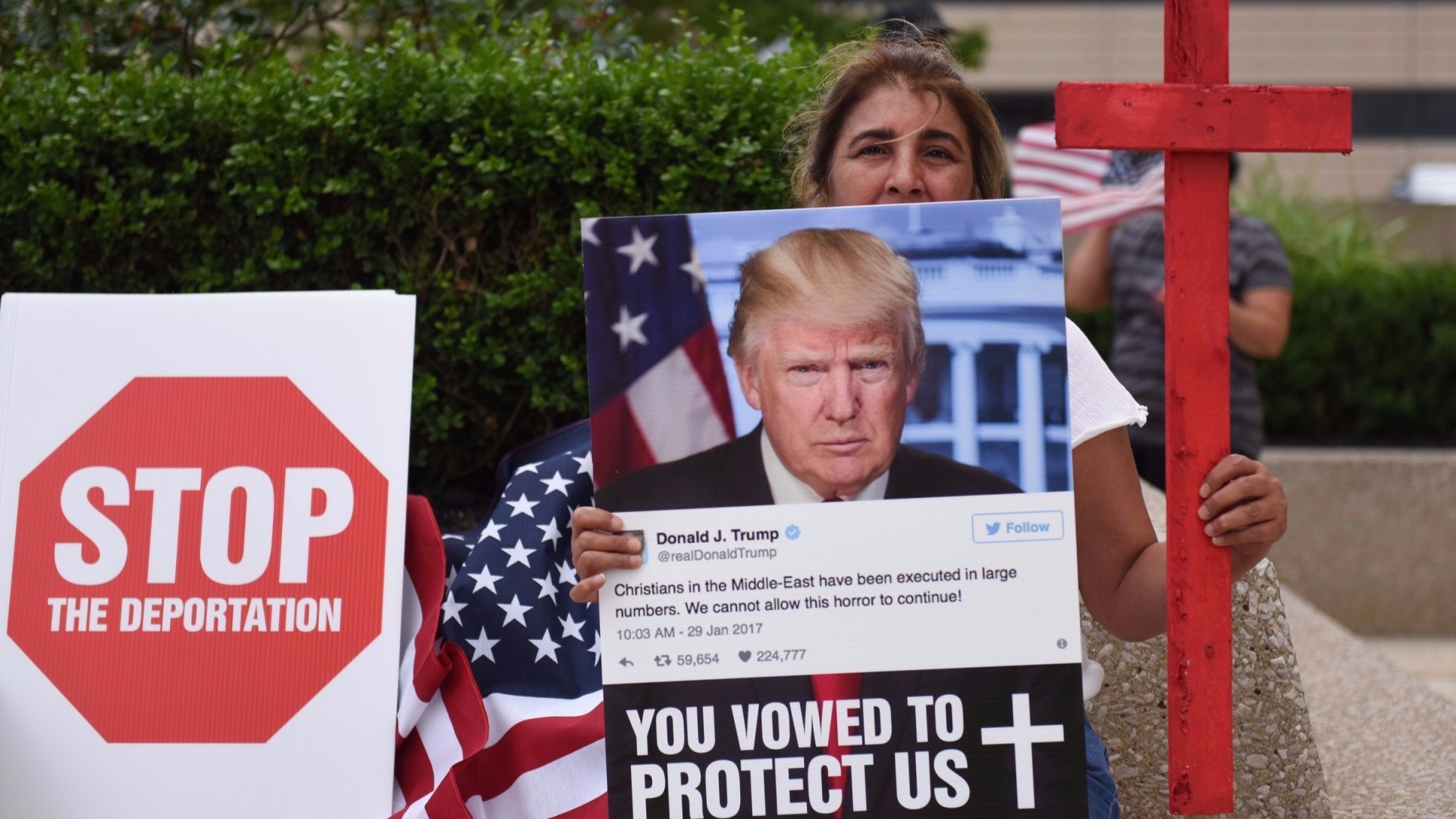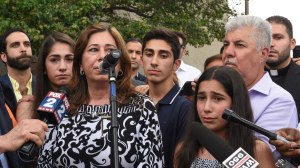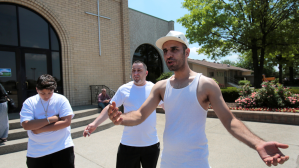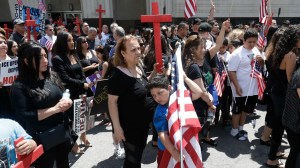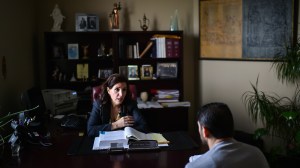In this series
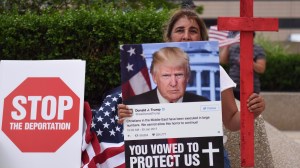
With the fate of 199 Iraqi nationals on hold while a Detroit court hears a lawsuit, a group of evangelical leaders has sent the Trump administration a simple message: Don’t deport Christians into genocide.
“We write urgently and with grave concern that Christians will be removed from the United States to face potential persecution, and even death, in the Middle East,” begins an open letter addressed to Secretary of Homeland Security John Kelly and signed by the seven leaders of the Evangelical Immigration Table (EIT).
The letter calls on the Trump administration to “exercise the discretion available under the law to defer the deportation of Chaldeans who pose no threat to US public safety to Iraq.” It also asks for the same considerations for Iraqis of other faiths.
The signatories include Leith Anderson, president of the National Association of Evangelicals; Scott Arbeiter, president of World Relief; Samuel Rodriguez, president of the National Hispanic Christian Leadership Conference; Russell Moore, president of the Ethics and Religious Liberty Commission of the Southern Baptist Convention; Shirley V. Hoogstra, president of the Council for Christian Colleges and Universities; Jo Anne Lyon, ambassador and general superintendent emerita of The Wesleyan Church; and Hyepin Im, president and CEO of Korean Churches for Community Development.
The letter comes a week after scores of Iraqi Christians living around Detroit were plucked from their homes and cars—some on their way to church—and shackled by Immigration and Customs Enforcement (ICE) officers. A similar story unfolded at the same time among Iraqi Kurds around Nashville. Within a few days, more than 100 Iraqi nationals were detained, most of them bussed across state lines to a holding facility in Youngstown, Ohio.
Their next journey threatens to take them much farther from home.
More than 1,400 Iraqis in the United States are listed for potential deportation. An estimated 300 of them are Chaldeans, an ethnoreligious group comprised primarily of Iraqi Catholics.
For most of the past decade, deportation to Iraq was never a possibility because the Iraqi government refused to grant papers to repatriate deportees from the US. That changed when, as part of a deal to be removed from President Donald Trump’s seven-country travel ban, Iraq agreed to once again begin accepting deportees—something the war-ridden nation hadn’t done since 2010.
The first and only plane so far transporting deportees from the US to Baghdad took eight Iraqis in April.
With the weekend wave of detainments, however, the prospect of more one-way flights has taken on new urgency.
“Now everyone is riled up because it’s a crisis,” said Tiara Shaya, the niece of military veteran Nahidh Shaou who came to the US when he was five years old. Shaou was detained by ICE last September immediately upon finishing a three-decade sentence for shooting and wounding a police officer.
Prior to the massive roundup last weekend, Iraqis were being picked up by ICE at a steady clip, but not enough to inspire much activism—even within the close-knit Iraqi community in Detroit. Shaou’s imprisonment and looming deportation had hardly registered with political representatives and legal activists.
A mounting defense
“By 5:30 in the morning on Sunday, I was awakened by a phone call by a woman yelling and crying,” said Joseph T. Kassab, president and founder of the Iraqi Christians Advocacy and Empowerment Institute. “I couldn’t even recognize her name, because she couldn’t compose herself to tell me who she is.”
The woman’s husband, a father of four and a businessman in Michigan, had been arrested by ICE. She didn’t know where officers had taken him.
“Since then, the phone never stopped ringing,” said Kassab. “Each one of them told me a story about how brutal and how bad their situation is. To me, this is inhumane.”
Wisam Naoum, a finance lawyer and community leader providing legal aid to deportees and their families in Detroit, recited similar horror stories. “A guy got nabbed as he’s going into church. He was going to his daughter’s baptism and was picked up on his way in.”
Among those detained over the weekend are Usama “Sam” Hamama, a 54-year old father of four; Jihan Asker, a mother of three who has lived in the US since the age of 5; and Moayad Jalal Barash, the sole breadwinner for his four children. Those in ICE custody—at least 199 Iraqi immigrants arrested since May—include men and women; Arabs and Kurds; Shia and Sunni Muslims, but mostly Christians. Nearly all of them arrived in the US decades ago. Being forcibly returned to Iraq, a country blighted with the horrors of war and the terror of the Islamic State, would put them all in grave danger.
The gravity of that danger, and the breadth of ICE’s sweeping raids, has begun to stir influencers to action.
In the aftermath of the weekend raids, six congressmen from Michigan penned a letter to Kelly speaking on behalf of those arrested in the sweep. In part, the letter reads:
Individuals, most of whom are Chaldean but include Muslims as well, will be placed in great danger if deported to Iraq. Because of the horrors perpetrated against the Catholic Chaldean population in Iraq, these individuals could be stranded in a country in which they are subject to extreme jeopardy.
The vast majority of these individuals came to the US legally long ago but are subject to deportation now because they violated their visa restrictions by committing crimes of various degrees, or for other reasons. Those that committed crimes have, to the best of our knowledge, served any sentence and completed any parole. These individuals have put down roots. Many have married, helped raise families, worked hard, opened small businesses, and paid their taxes.
Most have no relatives in Iraq because they, or the families that brought them to America as children, left the country decades ago. The traditional Chaldean areas in Iraq have been uprooted, destroying much of what would have been left of “home” for the Chaldeans.
Two of the letters signatories, Sandy Levin and Brenda Lawrence, appeared at a rally last Friday in Detroit protesting the arrests.
A nearly identical letter, delivered to Vice President Mike Pence by former senator Bob Dole, was signed by more than a dozen Chaldean, Assyrian, and Jewish leaders, as well as politicians and a retired US Army colonel. The recent message from the evangelical figureheads turned the heat up still further.
“This is wrong, wrong, wrong. Deporting these Iraqi Christians is nothing less than a death sentence,” Moore told Baptist Press. “I cannot understand how our government could act so cruelly and counter-productively to some of the most vulnerable people in the world. These deportations should be stopped immediately. We should be protecting these imperiled people, not surrendering them up for execution.”
Even prominent evangelist Franklin Graham, a vocal defender of President Trump, said what he’d read about the roundup was “very disturbing,” and encouraged the President to “have someone investigate these cases thoroughly.” In his statement on Facebook, Graham, leader of both the Billy Graham Evangelistic Association and Samaritan’s Purse, said, “I don’t know all the details, but I would encourage our president to give great consideration to the threat to lives of Christians in countries like Iraq.”
The American Civil Liberties Union (ACLU) filed a lawsuit to prevent the deportation of all Iraqis detained since the inauguration of the Trump administration. CODE Legal Aid, Inc., a nonprofit providing legal advocacy, set up a command center to address the concerns of the families of deportees.
“Every family we’ve served as a kind of impromptu therapist,” says Naoum, “giving the families people to talk to who speak their language and know what’s going on.”
CODE lawyers Nadine Kalasho and Nora Youkhanna, both Iraqi Christians themselves, are co-counsel in the ACLU filing. After the first hearing on the case, yesterday in Detroit, none of the Chaldeans in question will be deported before June 27 (though the federal government disputes the judge’s jurisdiction).
The lawsuit cites US obligations under the Refugee Act and the Convention Against Torture to prohibit the government from deporting anyone to a country where he or she is likely to face torture or persecution. Years of sectarian conflict and the brutal, so-called caliphate of the Islamic State threaten all Iraqis, not least of all paperless deportees from the United States.
The arrests have not stopped. In the middle of last week, 114 Iraqis had been detained in Detroit alone. By Sunday, that number had surpassed 150.
Jamie Johnson, director of the US Department of Homeland Security Center for Faith-Based and Neighborhood Partnerships, provided ICE’s official statement on the arrests, which explains:
Since May 2017, the agency has arrested 199 Iraqi nationals nationwide, the overwhelming majority of whom had criminal convictions for crimes including homicide, rape, aggravated assault, kidnapping, burglary, drug trafficking, robbery, sex assault, weapons violations and other offenses.
…
ICE focuses its enforcement resources on individuals who post a threat to national security, public safety, and border security. However, as Secretary Kelly has made clear, ICE will not exempt classes or categories of removable aliens from potential enforcement.
The backlash hasn’t been quelled. With the sudden, massive influx of Iraqis streamlined for expulsion, despite the risks—and, some argue, the law—public outcry has made a sharp rise.
“We rolled up our sleeves,” said Kassab. “We are trying to put up a plan and strategy on how to stop it.”
Repeating history
Nadia Shaya, sister of Shaou, the detained veteran, is all too familiar with this series of unfortunate—and death-defying—events. Seven years ago, a close friend was deported to Iraq alongside a plane-full of other Iraqis.
“Here we are again,” she said. “How history repeats itself.”
Kassab remembers the 2010 Iraqi deportation crisis as well. “We carry some experience,” he said. At the time, when he was executive director of the Chaldean Federation of America (CFA), he was instrumental in slowing down the deportations.
Last time around, the reaction to the wave of deportations preempted the Iraqi government and the Obama administration halting the forcible return of Iraqis to their native land. With the situation in Iraq even worse today—ISIS did not even exist in its current form seven years ago—many, including Kassab and Nadia, believe the precedent may bear repeating.
“The nightmare that we went through then,” said Nadia. “This cannot happen again.”
Shaou is not covered by the ACLU’s lawsuit, because he was detained prior to Trump’s inauguration. However, the emergency stay that has prevented his deportation thus far is still in place, and the groundswell of support for the more recently detained Iraqis has brought a new sense of hope.
Nadia talked to her brother Friday morning and says that, while somewhat anxious, his spirits are up. The news of growing public support is a relief, though Nadia regrets it took this much turmoil to bring it out. After her experience seven years ago, she saw the writing on the wall.
“Of course we’re happy and hoping [the public reaction] will help the other Chaldean Christians,” she said. “That was my whole thing from the beginning. It wasn’t just for my brother. I saw what was going to happen to the others as well.”
Her daughter Tiara, Shaou’s niece, also feels the tension of the moment. “While I’m saddened that other people are in this situation, it also has brought more light to the situation and more intention and more progress. So I’m happy that people are galvanized to action now, but the circumstances are unfortunate.”
She calls on Christian leaders to stand up and to rally people to action. “We can’t have it both ways,” she said. “We can’t say we’re fighting ISIS and protecting Iraqi Christians, then also deport Iraqi Christians to where Christian genocide is happening.”
And for those who give past crimes the last word?
“Criminal background should have no bearing because, regardless, we don’t send people to their deaths,” said Tiara. “Not on a political level as Americans, and not on a religious level as Christians. I think it really contradicts the entire message of Jesus.”
The EIT letter echoes her sentiment.
“We do not minimize the serious criminal offenses of which some of these individuals have been convicted; it is entirely appropriate that they be punished for their offenses,” wrote the evangelical leaders. “However, having served their sentences, we must seriously consider whether it is just to deport a person who poses little risk to the American public to a situation where they are likely to experience significant harm because of their faith.”

